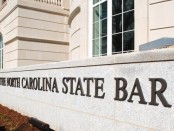FEO
View the Formal Ethics Opinion in Full Here. The Ethics Committee adopted 2014 Formal Ethics Opinion 8 at its meeting on January 23, 2015. The opinion examines the ethics of a lawyer accepting an invitation from a judge to connect on LinkedIn, the popular social networking website for professionals. Social networking websites have become a major tool to utilize for job searches as well as connections in the professional world, including the legal profession. According to the opinion, the same
[...]
View the Formal Ethics Opinion in Full Here. The Ethics Committee of the North Carolina Bar took an unusual step at its quarterly meeting held on October 24, 2014. The Committee withdrew a previous opinion, voting instead to adopt an alternative version of the 2013 Formal Ethics Opinion 2. The opinion examines the issue of whether a criminal defense lawyer must provide a client with the opportunity to review discovery materials pertinent to his or her case. Rule 1.4 of the North Carolina
[...]
View the Formal Ethics Opinion in Full Here. The Ethics Committee voted to publish 2014 Formal Ethics Opinion 6 at its meeting on July 25, 2014. The opinion examines the issue of a lawyer offering her services to a nonprofit organization on a volunteer basis. Members of the nonprofit organization would have the opportunity to consult with the lawyer concerning their legal questions. The members would also have the option to retain the lawyer to represent them in personal matters, thus
[...]
View the Formal Ethics Opinion in Full Here. Editor’s Note: At its meeting on July 17, 2015, the Ethics Committed voted to withdraw this opinion, and offer a substitute opinion. The substitute opinion can be found here. During its quarterly meeting on July 25, 2014, the Ethics Committee voted to publish 2014 Formal Ethics Opinion 5. This opinion examines the issue of a client posting information on a social media website that could be used to impeach the client or could otherwise be
[...]
View the Formal Ethics Opinion in Full Here The Ethics Committee voted to publish 2013 Formal Ethics Opinion 14 for comment at its meeting on October 24, 2014. This opinion was published along with an alternative due to the split in opinion on whether a lawyer can represent multiple parties to a commercial real estate loan closing. This opinion and its alternative reach different conclusions. The first proposed opinion was adopted at the Committee’s meeting on January 23, 2015. Under
[...]
What is an attorney’s responsibility relative to electronic records following termination of representation?
[...]
May an attorney immediately disburse against funds credited to a client trust account by automated clearinghouse transfer and electronic funds transfer?
[...]
What is the extent of a defense attorney’s responsibility to provide a client with discovery during representation in a criminal matter?
[...]
Participation in legal advertising services is permitted, as long as the service makes the appropriate disclosures “fully, accurately, and prominently."
[...]
Guidance for lawyers who are employed by a public interest law organization that provides legal and non-legal services to its clientele, and has a non-lawyer executive director.
[...]
There is no per se ethical rule against a prosecutor agreeing to support a defendant’s motion for appropriate relief in exchange for a defendant executing a release of claims.
[...]
“The prudent practice is for all counsel involved in a matter to establish at the outset a procedure for determining whether it is acceptable to ‘reply to all’ when a represented party is copied on an electronic communication.”
[...]
A law firm may not share fees earned in a tax appeal with a nonlawyer tax representative, unless the nonlawyer representative is legally permitted to represent claimants before the applicable authority.
[...]
When a defendant in a criminal case misses court due to being in the custody of the United States Immigration and Customs Enforcement, it is not an ethics violation for the prosecutor in the case to seek an order for arrest even though the defendant’s failure to appear was not willful.
[...]
In the absence of disclosure, an attorney may not later represent another party in a “substantially related matter” if the information the attorney received while previously acting as trustee is “material to the matter.”
[...]
«
1
2
3
»



